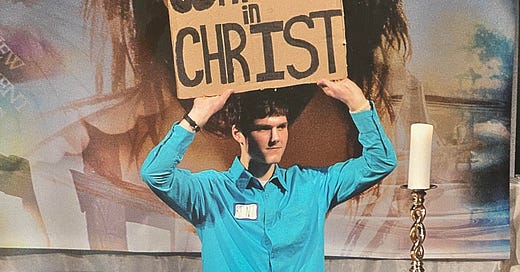Heaven, Hell, & Holy Body Norms
The Christian church's obsession with thinness, and how it impacts all of us
Content warning: Description of anti-fat bias in a Christian setting.
I don’t make a habit of listening to sermons from my childhood church. But after recently posting a joke about hell being fake (which it is), a lady from my old church reached out and included a link to a recent sermon from the church I grew up in. She meant well. She wanted to gently remind me that Hell was, in fact, real; she didn’t want me to go there. Very mindful.
I listened to the sermon, and took notes. Long story short: Hell is real. Very real. Deadly serious. Don’t joke about it. Maybe after death, if they’re lucky, non-Christians might be able to change their minds and avoid the lake of fire. Pretty typical, especially that last part to ease the Christians’ guilt and to get God off-the-hook for Hell. People are choosing to go to Hell, God isn’t putting them there. But something the pastor said about Heaven and bodies made me actually gasp.
As the pastor shared about the glories of heaven, he said this:
“In that final heaven… there will be resurrection into our new bodies. Resurrection is the final blow to death, it is the final blow to calories, and extra weight, and you will be whatever your perfected body is that God wants you to have or that you dream of. That's going to be you, that's going to be us, as we resurrect into new life with Jesus.”
First: Whaaaat?! Why. The. Hell… are calories and “extra weight” mentioned as one of the very first attributes of heaven? I’m still asking myself that.
Second: In other words; the Godly body is a thin body, without “extra weight.” The “perfected body” God wants you to have is thin. (See Jesus below.) Additionally, the fight between the body’s desires for “calories” and our minds’ attempts to control them is a spiritual matter. I’d received this message from the church in covert ways throughout my childhood and young adult life, but to hear it so overtly in the year 2024 is mind-boggling.
This sermon—which so closely connects the glories of heaven with thinness—has stuck with me. The inverse of this message is that fatness and body diversity (“extra weight” as the pastor calls it) is a product of sin and distance from God. No fucking wonder the topic of religious trauma/eating disorders comes up so often in my work with queer people. On a personal level, no wonder my eating disorder started as an attempt to purify my body right at the age when my queerness became unavoidable.
In a way, I’m grateful to this pastor. He said the quiet part out loud. He unintentionally took an insidious and unspoken connection in the Christian world between godliness and thinness, “sin” and fatness, and brought it to the surface. By using this offhanded example, the pastor showed his—and other evangelicals’—view that bodies outside the Western norms of attractiveness are deemed ungodly. Why else would these bodies be transformed and shrunk in heaven?
Sadly, what is said on pulpits in Christian churches reflects many of the messages we receive outside the church. These messages of purity and godliness permeate our Western culture. They’re baked into how we view our bodies, and show up in marketing around “guiltless” foods, “clean” eating, “self-discipline,” physical “fitness.”
In my experience, the gap between mentally knowing that Hell was fake and actually feeling that truth in my body took years. But the first step was saying it out loud: Hell is fake. Similarly, the gap between knowing that thinness does not mean godliness/rightness (that fatness does not mean sinfulness/wrongness) and feeling that in our bodies takes time. Years.
This body moralization—connecting body size, “health”, etc. to assumed worthiness or lack thereof—impacts all of us, inside and outside the Christian church. And while I can confidently say any god that exists doesn’t give a shit about your body size, the social belief that God cares makes it real. These beliefs aren’t just thoughts, they create real-life barriers to care and humanity. We can’t simply think our way out of these very real social norms.
Until all this shit changes, let me be another voice whispering into the void: Your body is not a sin.





Love this, Kent! You are shedding light on the unspoken truths so beautifully
The gap between knowing and feeling - such an important articulation.